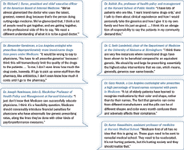Brand vs. Generic: Physicians Weigh In
Pharmaceutical Executive
Why do some doctors prescribe more generic drugs than others?
The costs of keeping people healthy, or at least alive and out of the hospital, continue to grow. Whether it's another percentage point of GDP, another out-of-pocket catastrophe for a patient, or simply a rise in monthly health insurance premiums, everyone gets stuck with the bill.
Surely generic utilization is an important element of any cost-saving scheme, since patients get the same medicine for a fraction of the price. Developed nations as a whole – defined by IMS Health as the US, Japan, Germany, France, Italy, Spain, UK, Canada and South Korea – reduced their medicine spending for the first time in 2012, in part due to stronger regulatory rules promoting generic substitution, according to a recent IMS Health report.

In a separate report published last month, ProPublica authors Charles Ornstein and Tracy Weber wondered why US Medicare is "wasting hundreds of millions of dollars a year by failing to look into doctors who disproportionately prescribe brand-name drugs." To find out why generics sometimes aren't being prescribed when they're available, Ornstein and Weber asked the prescribers themselves. Below is a selection of those responses, published by the authors' permission.

Ben Comer is Pharmaceutical Executive's senior editor. He can be reached at bcomer@advanstar.com

FDA Outlines Updated Requirement for Placebo-Controlled Trials in Vaccine Research
May 21st 2025In an article recently published by The New England Journal of Medicine, FDA higher-ups Vinay Prasad, MD, MPH; and Martin A. Makary, MD, MPH, wrote that any new COVID-19 vaccine must now be evaluated in placebo-controlled studies.
Addressing Disparities in Psoriasis Trials: Takeda's Strategies for Inclusivity in Clinical Research
April 14th 2025LaShell Robinson, Head of Global Feasibility and Trial Equity at Takeda, speaks about the company's strategies to engage patients in underrepresented populations in its phase III psoriasis trials.
Beyond the Prescription: Pharma's Role in Digital Health Conversations
April 1st 2025Join us for an insightful conversation with Jennifer Harakal, Head of Regulatory Affairs at Canopy Life Sciences, as we unpack the evolving intersection of social media and healthcare decisions. Discover how pharmaceutical companies can navigate regulatory challenges while meaningfully engaging with consumers in digital spaces. Jennifer shares expert strategies for responsible marketing, working with influencers, and creating educational content that bridges the gap between patients and healthcare providers. A must-listen for pharma marketers looking to build trust and compliance in today's social media landscape.